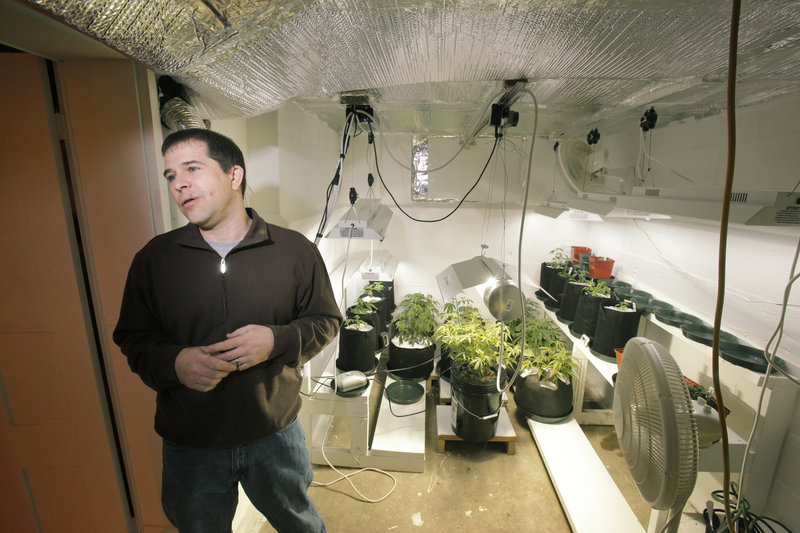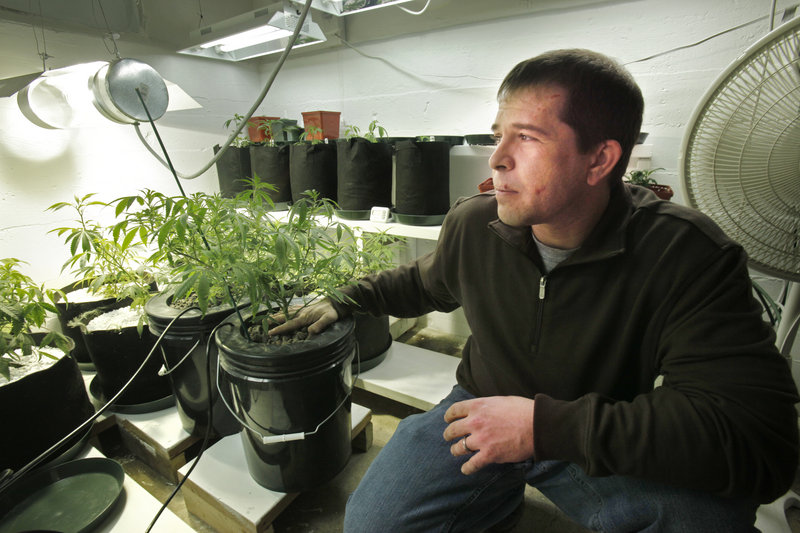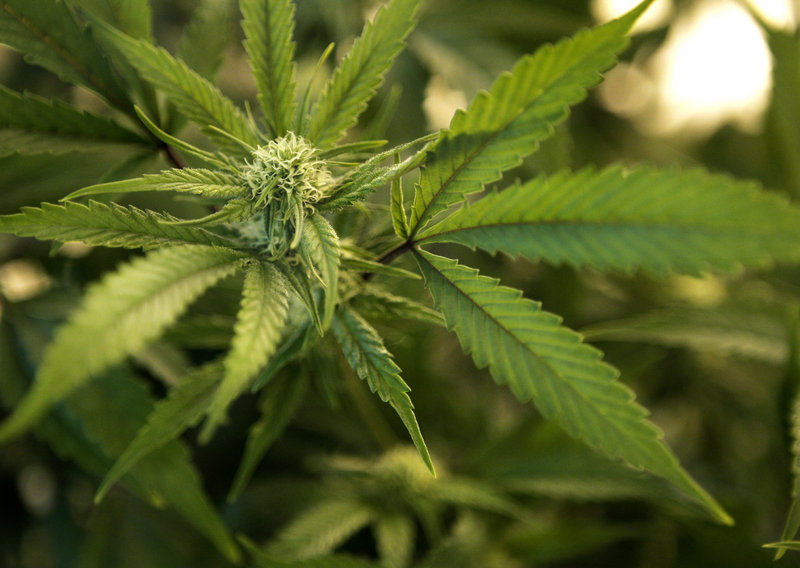When Ron Fousek started growing medical marijuana last February for a Portland man with HIV and hepatitis C, there were few people offering that service, he said.
Now, more than 100 medical marijuana caregivers in Maine have made growing pot a legitimate part-time job.
Fousek, who has since taken on four more patients, said he spends about 30 hours a week in his grow room, where dozens of marijuana plants are in different stages of development.
The patients can choose from more than 20 strains of marijuana, which he delivers to their homes. He charges between $50 and $350 per ounce, depending on what each patient can afford, he said.
The demand for medical marijuana has risen sharply since the state adopted a new law last spring allowing dispensaries to sell the drug. The law also expanded the list of conditions that qualify patients to use marijuana.
In addition, news surrounding the law made more people aware of marijuana as medicine, said Jonathan Leavitt, a leader of the state’s movement.
Last week, nearly 500 Maine residents had registered with the Department of Health and Human Services as medical marijuana patients. Until the first dispensaries start to open in late March, caregivers are the only legal source of marijuana for patients, unless they grow their own.
Like patients, caregivers have to register with the state — a rule that took effect Jan. 1. last week, the state had issued identification cards to 113 caregivers and had more applications to process.
Caregivers, who are limited to five patients other than themselves, have to pay a $300 fee per patient and can have up to six flowering plants for each of them.
The state has allowed caregivers to grow marijuana plants for qualified patients since 1999, but previously there were few regulations.
“It was pretty informal,” said Catherine Cobb, the DHHS’ director of licensing and regulatory services.
Cobb said the state has no way of knowing how many caregivers existed under the old law. Leavitt suspects there were no more than a couple dozen.
“The previous law was not known by very many people,” he said.
That changed when more than 60 percent of Maine voters approved dispensaries in 2009. The referendum campaign was driven by the Maine Marijuana Policy Initiative, a group led by Leavitt.
After the details of the law were fleshed out, however, Leavitt shifted his support from dispensaries to caregivers.
“We had envisioned small mom-and-pop dispensaries in every city and town,” he said, not the “large-scale operations” under the law, which allows only eight clinics in the state.
Now, he believes caregivers are the best option for patients.
In the fall, Leavitt’s advocacy group morphed into a trade association called Medical Marijuana Caregivers of Maine. Its primary purpose is to lobby for caregivers’ rights, and the group has been working on legislation to amend the law, Leavitt said.
Some of its goals are to eliminate the registration requirement and stop state inspections of caregivers with more than two patients.
The association also connects caregivers to patients in need of a grower — a service offered by several Internet-based caregiver networks as well.
One of them, Compassionate Caregivers of Maine, has placed about 50 patients with a dozen caregivers, said Marty Macisso, the group’s public relations director.
Others — Maine Medical Marijuana Inc., Maine Cannabis Caregivers and Maine Grass Roots — either didn’t return calls and e-mails or declined to comment.
Despite the public awareness generated by the expanded law, many caregivers still have reservations about being associated with medical marijuana. For some, it’s full-blown fear.
Fousek said high-profile arrests haven’t helped assuage those concerns. He pointed to Chris Bartkowicz, a Colorado caregiver who was raided last year by U.S. Drug Enforcement Administration agents soon after appearing on a televised newscast. Bartkowicz was sentenced in late January to five years in prison, according to published reports.
Last month, Bryan Branciforte, a licensed caregiver in Old Orchard Beach, was arrested on a charge of aggravated cultivation of marijuana.
In both cases, police said the men weren’t operating within the confines of their states’ medical marijuana laws.
Fousek, who lives in South Berwick, said his greatest fear is being robbed. For that reason, MaineToday Media agreed not to divulge the exact location of his York County growing operation.
A higher level of security is one reason dispensary operators say patients might prefer to go to a clinic rather than a caregiver. Another is convenience.
But Leavitt said he’s not concerned about patients abandoning caregivers once the dispensaries are open. For one, he said, the clinics will be more expensive.
The dispensaries’ proposed prices range from $250 to $400 per ounce, according to their applications to the state. Leavitt said he discourages caregivers from charging more than $250.
Caregivers also provide more personalized service, said Leavitt.
“Patients want people who can be there for emotional support, for conversation,” he said. “It will be hard for dispensaries to play that role.”
Tim Smale, who’s opening a dispensary in Auburn, said caregivers and dispensaries have different benefits. He doesn’t think they’ll compete.
Smale believes the pool of patients will continue to grow and people will choose whichever source is best for them.
“We won’t be carving up the pie into smaller pieces between us,” he said. “The pie will get larger for both.”
Copy the Story Link
Send questions/comments to the editors.






Success. Please wait for the page to reload. If the page does not reload within 5 seconds, please refresh the page.
Enter your email and password to access comments.
Hi, to comment on stories you must . This profile is in addition to your subscription and website login.
Already have a commenting profile? .
Invalid username/password.
Please check your email to confirm and complete your registration.
Only subscribers are eligible to post comments. Please subscribe or login first for digital access. Here’s why.
Use the form below to reset your password. When you've submitted your account email, we will send an email with a reset code.